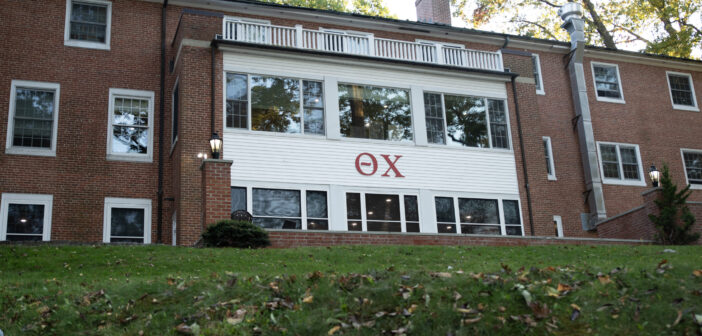The Lehigh Interfraternity Council announced that of the five potential fraternities that presented to be added to Lehigh’s campus, two have officially been chosen to be welcomed to the Hill in 2024 and 2026.
Pi Lambda Phi will be reintroduced to the Interfraternity Council at Lehigh in the spring 2024 semester and Pi Kappa Phi will be welcomed for the first time to Lehigh in the spring of 2026.
Sara Runyon, the assistant dean and director of the office of student involvement, said between 65 and 90 people have consistently rushed fraternities and either failed to receive a bid or have refused a received bid for the past couple of years.
“There was a growing need to be able to provide more opportunities for students who are interested in joining an Interfraternity Council organization and for students to be able to find an organization that’s right for them,” Runyon said.
Pi Lambda Phi was originally founded at Yale University in 1895. It was the first non-sectarian fraternity in the United States, meaning it accepted men without regard to religion or race as it strived to eliminate prejudice.
According to the Pi Lamba Phi website, the fraternity’s values include promoting academics, philanthropic engagement and lifelong relationships.
Pi Lambda Phi was specifically chosen for Lehigh because of its programs regarding emotional intelligence and leadership development. The hope for Pi Lambda Phi is to create an impactful legacy at Lehigh and within the Lehigh community.
In 1995, Pi Lambda Phi was removed from the Lehigh campus due to low membership and financial issues, according to Lehigh Student Affairs.
Sean McCann, a senior and executive member of the Interfraternity Council, said many of these issues have been rectified.
“(Pi Lambda Phi) showed up with the most alumni that we had seen out of the five presentations,” McCann said.
Runyon said a lot has changed in the past 30 years with how fraternity recruitment happens at Lehigh.
She said they’ll have staff on campus to help recruit the initial members in the spring, and one of those staff members will stay with them for an entire year.
“(They will) help train them all things related to running the fraternity and retention of members is a big part of that,” Runyon said.
Pi Kappa Phi was originally established at the College of Charleston in 1904,
The goal is to create a lifelong brotherhood that encourages service and leadership for the benefit of society, according to the Pi Kappa Phi website. Some of the values of Pi Kappa Phi include personal responsibility, campus involvement and commitment.
Pi Kappa Phi was chosen for its approach toward positively engaging with alumni and its mental health resources. The hope is for Pi Kappa Phi to help further promote healthy fraternal experiences on campus.
Runyon said these two fraternities stood out because of their strong commitments to diversity, equity and inclusion, as well as the unique leadership development and mental health services they provide.
“They’re doing different things but on a similar level of support and really wanting to build strong connections for membership,” Runyon said.
Chrisani Glass, ‘27, said he was unaware of the names of the new fraternities and said he doesn’t have an opinion of either one but is supportive of the new fraternities.
“It gives (students) the chance to create their own community instead of having to join one where it’s already pre-built,” Glass said. “It’s cool that we’re able to build more of a community and let other people feel more welcome.”
McCann said the Interfraternity Council wanted to add these two new fraternities to match an increasingly diverse set of students each year and the range of opportunities these incoming students are looking for.
He said it is a good opportunity to attract prospective and first-year students who are figuring out how they want their Lehigh experience to look.
“We want them to turn to the Interfraternity Council and see that there’s a fraternity experience that matches their ideal vision of a fraternity, regardless of who they are or where they come from,” McCann said.
Runyon said that anyone who is interested in joining Pi Lambda Phi or Pi Kappa Phi or is interested in bringing a new organization to Lehigh should contact the Office of Student Involvement at infrasor@lehigh.edu.
McCann said he was very excited overall to see the level of interest different fraternities had in starting a chapter at Lehigh.
“It demonstrated that there are people nationally and locally that want to facilitate a positive Greek experience,” McCann said. “And we’re very thankful to all the organizations that applied and all the students that helped in the decision-making process to shape the future of the Interfraternity Council community.”






Comment policy
Comments posted to The Brown and White website are reviewed by a moderator before being approved. Incendiary speech or harassing language, including comments targeted at individuals, may be deemed unacceptable and not published. Spam and other soliciting will also be declined.
The Brown and White also reserves the right to not publish entirely anonymous comments.
2 Comments
I am delighted that the Lehigh Greek System is sufficiently thriving to allow for the expansion of two chapters. I welcome Pi Lam back to campus and I wish success for both Pi Lam and Pi Kappa Phi.
The 2004 Greek Life Task Force and the subsequent Greek Life Implementation Report recommended that system expansion prioritize formerly recognized chapters, which number about 25 (https://studentaffairs.lehigh.edu/content/formerly-recognized-unrecognized-groups). It is thus disheartening, dismaying, flabbergasting, and perplexing why Pi Kappa Phi was granted admission ahead of a formerly recognized chapter, who all have existing Lehigh alumni. No prior Lehigh fraternity expansion ever allowed a chapter not previously part of the Lehigh Greek System.
My best wishes for the new chapters’ success is, in part, so that there will be future expansion opportunities and that those chapters will be exclusively from the list of 25.
– David Polakoff ’86
Lehigh Greek Alumni Council, Past President
Sigma Alpha Mu, Brother and Past Alumni President
David—Please be more transparent in your post. Your fraternity, Sigma Alpha Mu (SAM), was one of five organizations that made it through the initial application process and were invited to campus to present to IFC, Lehigh administration, and other campus stakeholders, and was ultimately not extended an offer to return to Lehigh on the merits. Instead, you point to a nearly 20 year old non-binding report written by 15 people—14 of whom either no longer work at Lehigh or are no longer engaged with the Lehigh Greek community—to suggest that this expansion process was fundamentally flawed. Let’s set the record straight: This expansion committee was comprised of representatives from the IFC Executive Board and every IFC chapter, and worked in consultation with the Lehigh administration. In this expansion process, 22 fraternities submitted applications to join or rejoin the Lehigh Greek community and the committee selected 5 organizations—4 of which previously existed at Lehigh—to campus stakeholders and ultimately recommended to the administration the 2 fraternities they felt, as students and fraternity leaders, would be the best additions to the Lehigh Greek community. I understand you might be disheartened or dismayed by the decision that your fraternity was not chosen, but SAM’s headquarters staff and alumni unfortunately fell short in their pitch relative to these other 2 organizations. As a current Greek advisor, I’m impressed by the student leaders’ diligence, care, and consideration in making this selection.